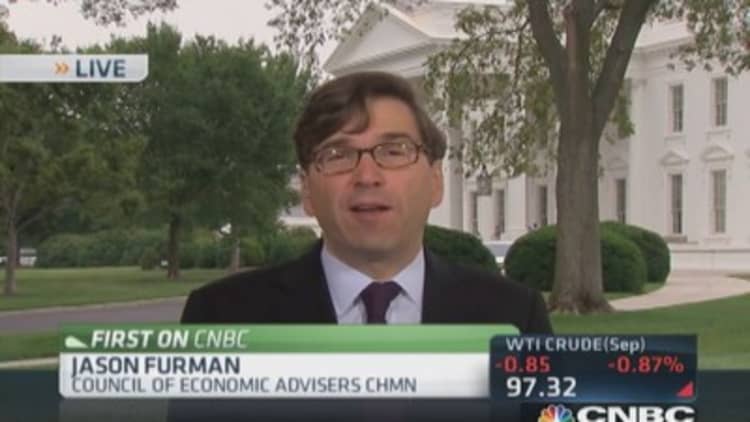At first glance, Friday's employment report showing a gain of 209,000 jobs and a slight uptick to 6.2 percent unemployment based on more people joining the labor force should be good news for Democrats.
After all, it's the sixth straight month of over 200,000, the best such streak since the Internet bubble days.
"If you look at this report, overall it was strong and it's a continued reflection of the strengthening of the economy," Jason Furman, chair of the White House Council of Economic Advisers told CNBC. "We've now had six straight months of job growth above 200,000. That's the first time we've seen a streak like that since 1997."
But Furman and Democrats shouldn't really celebrate.
Because the report was both a decline from June's revised 298,000 and contained a very soft underbelly. The biggest problem: Wages barely budged, moving up just 1 cent to $24.45 per hour. And the length of the work week remained flat, meaning employers feel no pressure to add hours to boost production.
From a markets perspective this was good news because it puts no new pressure on the Federal Reserve to move faster to boost interest rates. Long anticipated upward pressure on wages is so far nowhere to be found.
But from a political perspective, it's bad news for Democrats.
Because voters mostly don't care about the headline jobs number or how many months have been about 200,000. They care about the trend in their paychecks. And that trend is very bad and there are few signals that it's about to get a lot better.
Read More July jobs growth strong but not too strong
Overall, according to Moody's, per capita income adjusted for inflation has risen just 1.16 percent over the last two years. That's a decline from a 2.54 percent rate in the first two years of the recovery.
The impact is that consumers still feel strapped, something that is evident in low-end retailers outperforming high-end retailers. And it's apparent in low new household formation. Younger Americans simply don't have the cash to plunk down for down payments in an economy where lending standards are still tight. And slow wage gains means they'd have to save for years to afford to put 20 percent down.
This weak demand means slowing house price gains are likely to continue which in turn means people fortunate enough to own homes won't feel as wealthy and thus will be less likely to spend.
And all the spending on goods and services that goes with new home purchases is not likely to materialize to drive a faster economy the rest of the year.
While some economists remain bullish, the consensus is now that the 4 percent growth recorded in the second quarter may both represent the high water mark for the year and could get revised down in future estimates.
Read More Job creation misses expectations in July, unemployment rate up to 6.2%
This means that generally sour views on the president's handling of the economy will likely persist and provide a headwind to Democrats hoping to avoid a GOP takeover of the Senate in November and limit GOP gains in the House.
The jobs report, of course, was not without many positive aspects. Any reading over 200,000 is more than enough to keep the jobless rate going down assuming no future big increases in the labor force.

And the quality of jobs being created continues to improve. Professional and business services added 47,000 jobs. The sector has added 648,000 jobs over the past 12 months. These tend to be higher paying than retail and food services positions that were more prevalent in earlier months of the recovery. Manufacturing added 28,000 jobs and construction increased by 22,000, both decent numbers.
And the fact that the labor force participation rate ticked up a tenth to 62.9 percent from 62.8 percent is a step, albeit a very small one, in the right direction. That rate, however, is still as low as it has been since the 1970s. The reasons for this are complex and include baby boom retirements. But it's also a strong talking point for Republicans who can argue that many former workers have simply given up on this economy.
Democrats, however, have one big advantage heading into the summer recess: their opponents' disarray. Republicans in the House finished up before the five-week break feuding madly among themselves over how to address the immigration crisis on the southern border, repeatedly filing and pulling bills due to lack of support.
By Friday morning, the GOP was left trying to get a purely political bill through the House that had no hope of becoming law as the Senate had already left town after Republicans shot down a Democratic immigration bill.
Read More The factor that may boost Democrats' midterm hopes
The embarrassing spectacle over immigration is not likely to leave voters with the impression that the GOP is a governing party that should be entrusted with full governance of Capitol Hill. And the economy, while hardly going gangbusters, is also not bad enough to create a wave that would overwhelm marginal Democrats.
The upshot: The midterms will likely be grindingly close and could very well produce no change whatsoever in the partisan makeup of Washington. Just what we need: More of the same.
—By Ben White. White is Politico's chief economic correspondent and a CNBC contributor. He also authors the daily tip sheet Politico Morning Money [politico.com/morningmoney]. Follow him on Twitter @morningmoneyben.


